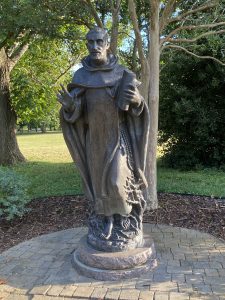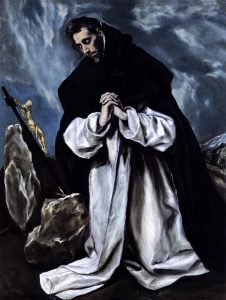Ord Om ordet
St Dominic
Father Bede Jarrett, in his life of Dominic, stresses the kindness and joyousness that, in this humane, amiable saint, coexisted with  immense austerity. Fr Bede wrote:
immense austerity. Fr Bede wrote:
Along the road as he travelled he had a word to say to everyone, hardly able to pass a group of pilgrims without going over and greeting them, helping to land some poor English wayfarers who had tumbled into a stream, making himself understood by a band of Germans who could not speak a common tongue with him: ‘He tried to talk of God to almost everyone he met on the highways.’
This generosity of soul was connatural to Dominic. The abbot of St Paul of Narbonne recalled how he ‘accepted insults, curses, and abuse with patience, and even joy’.
Is it not strange that this brightness of spirit shone in one who grieved so deeply at the mystery of iniquity that makes man, called to blessedness, cause himself misery; who wept hot tears for sinners; and assumed austere penances on their behalf?
Humanly speaking, yes, it is weird. But not in a perspective of faith. The profile of St Dominic makes me think of something Dom Augustin Guillerand once wrote about that crucial paradox of Christian existence: the call to discover strength in weakness. The Carthusian affirmed in a letter written to a friend:
To be strong is not a matter of rising up against that which hurts us in order to suppress it. There is another kind of strength, of a much higher order. It is the strength which accepts what cannot be suppressed and which, under the weight of the cross, still smiles. We do not smile at the cross. We smile at him who carried it before us, on our behalf, and who carries it still with us.
Compassion unfolding in Christ is alive with a secret joy, even in the midst of suffering; for it is aware of being carried by an immense, all-powerful love that will be victorious, vanquishing evil by transforming it, driving darkness out with light. 
St Dominic shows what this attitude of free abandonment to transformative love looks like. Such was his configuration to Christ that he wished to diminish so that Jesus might increase. His life is, in consequence, an icon — or a reflection — of the Saviour’s.
His motto was Veritas. He embodied truth before he proclaimed it; that is why his preaching had such force. We, too, are called to be truth’s ambassadors, each in our way, corresponding to God’s providential call, but without compromise, entirely and utterly.
The more progress we make along this royal road, the more we, too, shall know both the abyssal grief and the freeing joy of Christ’s triumphant cross. We shall become integral, credible Christians breathing even here below the air of everlasting life. Amen.
